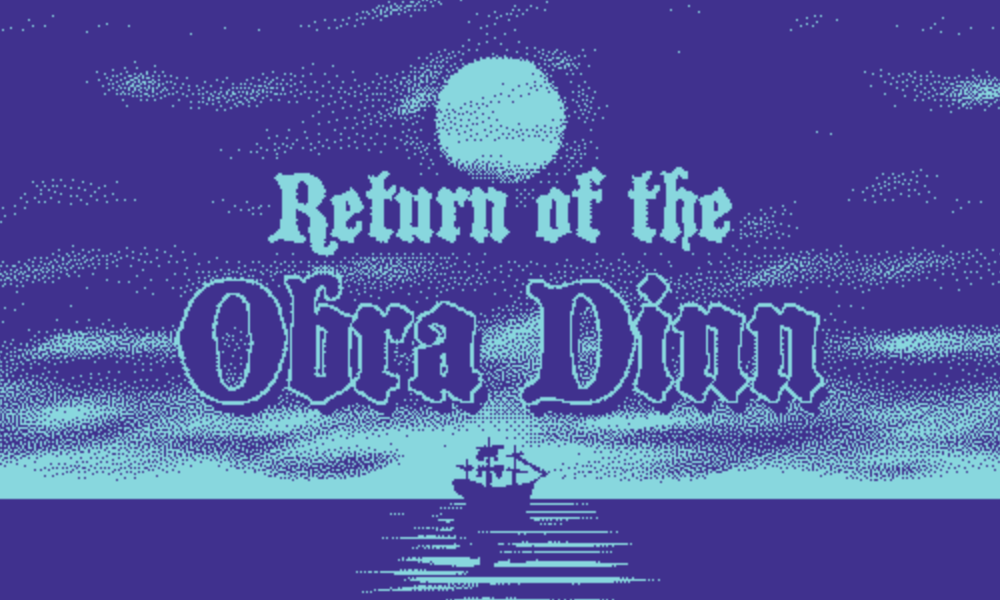[!info]
This post was originally intended for a Patreon audience.
Thoughts on Obra Dinn

It's hard to avoid other a mystery games when you're working on one yourself. While I'm not very fond of this channel, I ended up watching Mark Brown of GMTK praising Obra Dinn for not leading the player as much as possible. He suggested that it really let player feel like a detective and have "a-ha!" moments, but the story and mechanics didn't really feel like things detectives would do.
This was intriguing to me as I also want the player to feel like a detective. But, like I recently discovered, it appears to have more in common with puzzles than with detective adventures. I figured I'd eventually buy the game when it goes on sale in a few years to see what they've done, but when a friend gifted me a copy I ended up playing it much sooner than expected.
If you haven't played it yet and are interested in it, then stop here and read the rest of my thoughts on the game after you have done so.
[!warning]
SPOILERS AHEAD
Of course, this post is mostly just about my opinion. I think Obra Dinn is a great game worth buying! It has a great atmosphere and the gameplay is pretty good (although I do have some gripes about it that I will go into detail about in a bit).
After playing the game twice, the game feels a little underwhelming. Obra Dinn starts off pretty easy, which is fine, but then it immediately drops you off in the deep end. Among the things I experienced, portraits would get unblurred when I can't really fathom why and the difficulty rating for each portrait never seems to be right (some three triangle portraits were easy, but some two triangle portraits were incredibly difficult).
The game also spends a lot of time making the player wait. For example, when you first enter a death scene, you have to wait for a predetermined amount of time you cannot skip until the portraits are revealed to you. The time would always be too short or too long and I often found myself opening the book to record what I saw, but realizing that they haven't been revealed yet. It would have been nice if the portraits were revealed whenever you decided to open the book.
Death scenes sometimes have a lot of information in them about other people whose portraits are not revealed, but you can't fill in their fate until you find the death scene that does reveal their portrait. By the time I did find the right death scene, I wouldn't notice that the new portrait and that person I saw in the previous scene were the same, causing me to sometimes miss information.
Lastly, most of the game is in figuring out the names for each person; the cause of death is usually the easiest thing to do. Obra Dinn tries to keep you from brute-forcing the answers by waiting until you have three correct fates and giving you many different options to choose from. Unfortunately, it didn't do much in my case. Many times I would find myself in a situation where I would think either "These people are Chinese!" or "These people are topmen!" without being able to tell which person was which. In these cases, as I was never able to figure out how I was supposed to deduce this information and there aren't many choices left after you filter the list of names, I just cycled each person through all of the possible names until three correct fates were matched. This, I think, was the most unsatisfying part of the game.
It's true that I could give myself the challenge of only filling things in when I am sure of the answer. However, I would find when I was wrong I couldn't tell at all if anything I thought for sure was correct was incorrect. Sometimes, I would be sure a person died a certain way and that I got the name wrong or vice versa (and being incorrect about that assumption as well). Going between death scenes to verify assumptions and to look for more information is rather cumbersome and takes a long time. Usually, I would try to follow a specific person which involved going all around the ship to see each scene one by one.
After playing Obra Dinn, I really want to improve how easy it is to navigate and find information in Access. I think it's pretty easy to switch between conversations and read what has already been said, but there are a couple of things in the game such as dialog in a level introduction that are not persisted in a place the player can review later. It also seems desirable to let the player have a search function, so they can find things they vaguely remember but don't know the specific location of.
It also makes me wonder if the player should be able to access information from previous levels. It seems desirable, as Access has recurring characters, but it might be difficult to organize the information so it is easy to navigate.